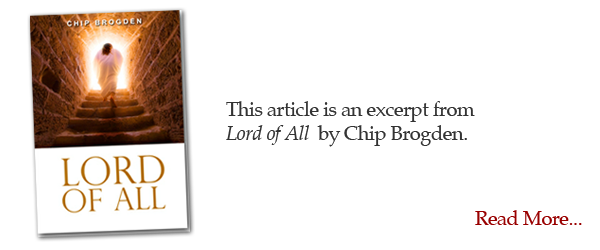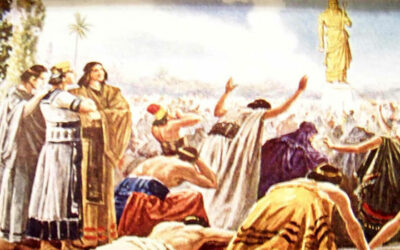Without saying a word, I hand you a piece of paper containing five verses of Scripture: Colossians 1:16-20.
“Read this,” I say.
And you agree.
“For by Him all things were created that are in heaven and that are on earth, visible and invisible, whether thrones or dominions or principalities or powers. All things were created through Him and for Him. And He is before all things, and in Him all things consist. And He is the head of the body, the church, who is the beginning, the firstborn from the dead, that in all things He may have the preeminence. For it pleased the Father that in Him all the fullness should dwell, and by Him to reconcile all things to Himself, by Him, whether things on earth or things in heaven, having made peace through the blood of His cross.”
As you study this one fragment of Scripture you learn quite a bit about Jesus.
In the first verse, you learn that there is a heaven and an earth, visible and invisible things, as well as thrones and dominions and principalities and powers; and that all these things were created by Jesus. But why were all these things created? They were created for Him. That is pretty comprehensive, isn’t it? Nothing is left out. Nothing is overlooked. Nothing arrived by chance or by luck, but everything was created by Him, for Him.
In the second verse, you learn that Jesus is before all things, and that in Him, all things consist. You dig more deeply into the meaning of this and realize that not only were all things created by Him, but all things continue to exist and are held together because of Him, which makes Him “before” or, more accurately, “above” all things. This is very vast, is it not? In order to create all things and hold them all together, this Person must be infinitely wise and powerful.
In the third verse, you learn of the existence of something called the “church,” also known as the Body of Christ, of which Jesus is referred to as the Head. You look up the word “church” and find that it is not a building, but a spiritual assembly of called out persons (the Ekklesia). You would conclude that this assembly of persons represents a smaller number of people compared to the rest of creation (since they are “called out” from the rest), and that this Ekklesia enjoys some kind of special relationship, fellowship, union and oneness with Christ that is very intimate.
You also find that Jesus is the Beginning and the Firstborn from the dead, which seems to imply that there are others who will follow in His footsteps and be born from the dead as well. Next, in this very full third verse, you see a grand intention and purpose revealed: “that in all things He may have the preeminence.” Your study of “preeminence” would reveal that it means to be in the first, the highest, the chief, the best, and the most superior position in a place of ascendency over anything and everything else. Again, this is all-inclusive. Which leads to a question: how can it be that the One Who created all things, and maintains all things, does not already have the preeminence? Why is it stated as a goal?
Keeping that question in mind for later, you continue on to the fourth verse, where you discover that God the Father is moving and acting in relation to His Son, the Father being the One Who created all things by Jesus Christ, Who is now pleased to have all of His own fullness dwell in His Son, so that His Son is the very image, the exact representation, of God. For what purpose?
This you find in the fifth and final verse. By Christ, God the Father wishes to reconcile all things to Himself. You surmise that there must have been a breakdown in the relationship between God and parts of His creation. Now you have the answer to your previous question. This must be the reason why the preeminence of Christ is stated as a goal. There are a few, referred to as the Body, who are walking in fellowship with Christ; and since He is the Head of the Body, He obviously has preeminence there. As the One Who created and upholds all things, He should have the preeminence in all things. But there are apparently those who remain outside of that fellowship. God is obviously not content with having some things reconciled; He wishes to have all things reconciled.
You study the word “reconcile” and you find something interesting: it means “to bring back to a former state of harmony.” So you conclude that at one time, Christ did have preeminence in all things, and all things were in right relationship with Him, until something happened to interrupt that relationship. This rift apparently affected both heaven and earth, and now God is actively working to bring reconciliation to the rest of Creation through His Son. What a wonderful story of love!
Then you finish reading the fifth verse and you find something interesting – that from God’s perspective, peace has already been made because it is referred to in the past tense: “Having made peace.” So God has already made peace with those who have fought against Him; now all that remains is for those fighting against Him to stop fighting and make their peace with Him. But from His point of view, the peace has already been made. This is extraordinary!
How was the peace made? “Through the blood of His cross.” With no other Scripture but these for you to reference, you might conclude that whatever the blood of His cross means, it must have been a terrible thing that somehow accomplished a great deal of good. You would make a note to check into that further, and by now you would be longing to read the rest of the story.
Having read these five verses, you might then go back and count the number of times the word “all” is used in connection with the description of Christ:
1) By Him all things were created.
2) All things were created through Him and for Him.
3) He is before all things.
4) In Him all things consist.
5) That in all things He may have the preeminence.
6) That in Him all the fullness should dwell.
7) By Him to reconcile all things to Himself.
If you had nothing else but this fragment of five verses to support your understanding, what would be your impression of Jesus? Would you have a large idea of Him, or a small idea of Him? Would you have any sense of limitation or restriction connected with Him, or would you get the sense that He is higher and deeper than anyone can properly appreciate?
This tiny portion of Scripture provides a remarkably complete picture of the infinite greatness of Christ, the plan and purpose of God to have His Son in the place of preeminence, and the tremendous energy of God at work through Christ to bring about a great reconciliation and restoration of all things.
In the same way that John 3:30 conveys so much in seven simple words, these five verses condense some very big ideas and spiritual truths into a very compact but all-encompassing Gift of Truth – a priceless treasure for us to unwrap, explore, and value more than all the wealth in the world.
Do you remember when you first received the Lord Jesus? How excited you were, and how great God seemed to be? It is only later, after we have begun to digest the doctrines and traditions of religion, that we tend to lose sight of the greatness of God and the preeminence of Christ. Man is exalted, and Christ is limited, through these religious traditions. But if we put those teachings aside, and simply focus on what God’s Word says, we find nothing to diminish our joy at the riches of His grace revealed in its pages.













